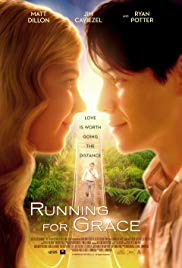
RUNNING FOR GRACE
US, 2018, 110 minutes, Colour.
Matt Dillon, Jim Caviezel, Ryan Potter, Olivia Ritchie, Juliet Mills, Nick Boraine.
Directed by David L. Cinningham.
Running with Grace (or, working title, Jo, the Medicine Runner) is a warm-hearted story, with touches of the tragic, that appeals to the wide range of audiences who want films that they can identify with, enjoy, that they consider wholesome.
In that sense, the film starts very well – but later, moves into rather melodramatic mode which some audiences will find offputting and, perhaps, undermining the atmosphere of the earlier part of the film.
The setting is a Hawaiian island in the 1920s, with many Japanese workers plantations. There are the American landowners, racist in their attitudes towards the Japanese. The film opens with a plague destroying a number of the residents, a young Japanese boy whose mother dies but who has concealed him from the community, his emerging when an American doctor arrives on the island and is stranded because of the financial situation - and stays.
Matt Dillon has a very sympathetic role as Doc, relying on the young boy for translation, especially when his ministrations are considered sinister and rejected. 10 years pass, Doc wants to adopt the boy and sets processes in motion. Meanwhile, Jo (Ryan Potter) helps Doc, goes to the house of the owners, the Danielsons (Nick Boraine is the father and Juliet Mills as the surprisingly severe and snobbish grandmother). They have a Japanese governess who actually narrates the story. Jo is attracted to the young Grace, Olivia Ritchie, whose mother died in the opening plague. He has the opportunity to tend her sprained ankle and there is quite an attraction.
Enter the villain, an alcoholic doctor, a con man, played by Jim Caviezel, far away from Jesus in The Passion of the Christ and other heroic roles he has undertaken. He is welcomed by the snobbish landowners who are going bankrupt, deceive him by offering him a place in the house and company, but the plan is upset when the owner is hurt in an accident.
There is tragedy when the con doctor drives into Doc – but, in time, comes the news that Jo is officially adopted, has a name, and can propose to Grace. These aspects of the screenplay are not unexpected!
The director and writer, David L.Cunningham has made a number of documentaries as well as the action fantasy, The Seeker and the war film, To End all Wars.
1. The title? The working title, Jo, The Medicine Runner? Emphases?
2. The Hawaiian settings, the coffee plantations, homes, mansions, the mountains, the sea? The musical score?
3. The 1920s? The post-war atmosphere? Japanese residents in Hawaii? The plantation owners? The racism? The portrait of the Japanese, the workers, the markets, social stigma, single mothers? The contrast with the presence of governesses in the mansions? The role of the Mayor?
4. The landowners, the Danielson family, arrogant, racist, the father authoritarian, control over his daughter, the presence of the governess? Despising of the Japanese? The failure of his business, his brutality towards his manager, wanting to diversify, the arrival of the doctor, wanting him to take over the plantation and bear the cost? His dislike for Doc, despising Jo? The treatment of Grace, his getting rid of their help, the snobbish attention to the new doctor? The plan for Grace to marry him? The accident, his being treated by Doc and Jo, their being dismissed, Reyes and the owner’s death?
5. The opening with the outbreak of disease, the deaths, quarantine? Jo, hiding, his mother concealing him? His being found by Doc? Translating for the Japanese – and the man so hostile to Doc, the syringe, slamming the door?
6. Doc, experience of the war, supplies to Hawaii, the financial collapse, his remaining, his being relied on to help people? The years passing, Jo growing up, Doc and his visits to the authorities in order to adopt Jo?
7. Life on the island, Jo and his running, beating the carriage and horses? His seeing Grace in the past, the attraction? Her sprain, his going to help, seeing only her ankle? Doc reprimanding him for going while he was away? The two returning, taking the temperature, the basil and the drink? His later returning, meeting Grace, giving Grace the flower, leaving the basil?
8. The arrival of the doctor, his car, Jo trying to outrace him? The doctor, conman, his drinking? Ingratiating himself with the family, their snobbery, discarding Doc, Danielson, his mother and her harsh snobbery? Helping Grace? His response to the situation, finding a position in the house, his not being told about the bankruptcy? Bringing his daughter, the preparations for the wedding, Danielson and his accident, Reyes incompetent and the death? The hastening of the wedding, the marquee on the grounds, his arriving in the car, drinking, defying Jo, crashing? His later being accused of murder?
9. The voice-over from the governess, her perspective on the characters and on life? Her presence in the household? The contrast with the harsh grandmother and her snobbery, scheming?
10. Jo, his disappointment at the marriage? His being with Doc on the road, Reyes crashing into him, Doc’s death?
11. The news of the adoption form, his racing to the wedding, being legitimate, having a name, proposing to Grace?
12. A happy ending, some racial reconciliation? But the prospect of the 30s, Japan, World War II?